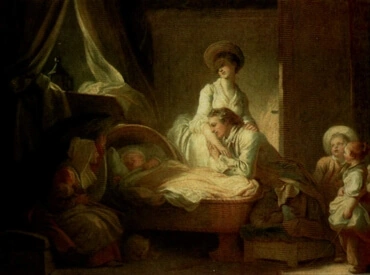In a general sense, being "born" in the Bible represents one spiritual state producing another, usually some form of love or affection producing or "giving birth" to truth or to desires for good. This is not hard to see: If you love someone, that love naturally gives birth to ideas on how to be good to that person and make him or her happy. This is why sons and daughters in the Bible represent true ideas and desires for good. On a higher level, though, being born represents what the Writings call "regeneration," or the life-long process of putting off our natural thoughts and desires and embracing spiritual life from the Lord. This is what the Bible means when it talks about being "born again" – if we live our lives from the Lord, He will eventually take away our evil desires so that we can be "born" as angels in heaven, free of evil desires and dark thoughts. Of course, these two levels of meaning are really one: The Lord is love itself, and if we align with Him we become forms of love and truth ourselves, expressions of His love just as the desire to do something good might be the expression of your love for a friend.
Arcana Coelestia #5348
5348. 'And to Joseph were born two sons' means the good and truth born from this, that is to say, from the influx of the celestial of the spiritual into the natural. This is clear from the meaning of 'being born' as being reborn, and so the birth of truth derived from good or faith derived from charity, dealt with in 4070, 4668, 5160 (for the generations described in the Word are spiritual ones, see 1145, 1255, 1330, 3263, 3279, 3860, 3866); and from the meaning of 'sons', who in this case are Manasseh and Ephraim, as good and truth, dealt with immediately below. For 'Manasseh' means the area of will belonging to the new natural, while 'Ephraim' means the area of understanding belonging to it. Or what amounts to the same, 'Manasseh' means the good present in the new natural, since good exists as an attribute of the will, while 'Ephraim' means the truth present there, since truth exists as an attribute of the understanding. One reads in other places about the birth of two sons. Good is meant by one, truth by the other, as for instance with Esau and Jacob. 'Esau' means good, see 3302, 3322, 3494, 3504, 3576, 3599, while 'Jacob' means truth, 3305, 3509, 3525, 3546, 3576. The like is meant by Judah's two sons by Tamar, Perez and Zerah, 4927-4929; and the same applies here in the case of Manasseh and Ephraim. The birth of these is dealt with here because the subject in what went immediately before this was the influx of the celestial of the spiritual into the natural and the consequent rebirth of it, which is effected solely by means of good and truth.
Arcana Coelestia #1895
1895. 'She had an Egyptian servant-girl' means the affection for knowledge. This is clear from the meaning of 'a servant-girl' and from the meaning of 'Egypt'. Sarai, who is the mistress or lady, represents and means truth allied to good, as stated already. Truth allied to good is in the genuine sense intellectual truth, but rational truth comes below this and so is inferior. The latter is born from knowledge and cognitions that have been made living by means of an affection corresponding to them. Because this affection is part of the exterior man, it ought to be subservient to intellectual truth, which resides inmostly, in the way that a servant-girl is subservient to her mistress or a maid to the lady of - the house. That affection therefore is what is represented and meant by 'the servant-girl Hagar'.
[2] No one can have much understanding of anything said about these matters until he knows what intellectual truth is in the genuine sense and also in what way the rational is born, namely from the internal man as the father, and from the exterior or natural man as the mother. Unless the two are joined together nothing rational ever comes into being. The rational is not born from knowledge and cognitions, as people suppose, but from the affection for them, as becomes clear merely from the fact that nobody can possibly become rational unless some delight in or affection for such knowledge and cognitions burns within him. The affection constitutes the maternal life itself, while the celestial and spiritual within that affection constitute the paternal life. Consequently it is the degree and the quality of a person's affection that determine the degree and the quality of the rationality that is developed in him. In themselves facts and cognitions are nothing other than things that are dead, or instrumental causes, which are made alive by the life that belongs to affection. This is how everyone's rational man is conceived. The reason why the servant-girl was Egyptian and why that fact is mentioned is that 'Egypt' means knowledge, as has been shown already in 1164, 1165, 1186, 1462,







